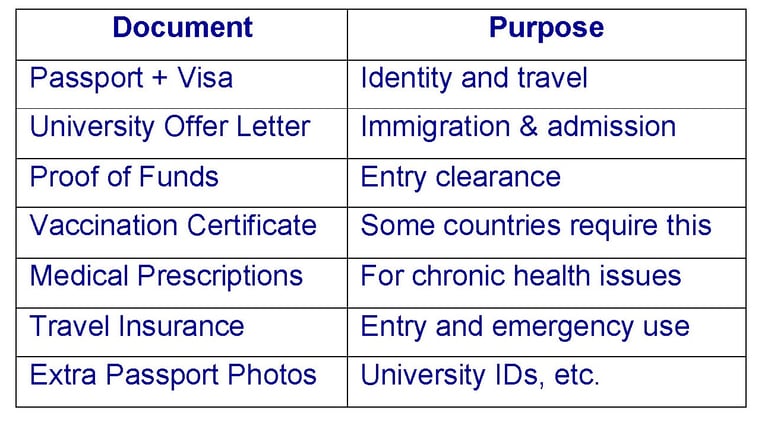✉ shreeconsultancyjsb@gmail.com ✆ Ph. No.: +91 78781-47589 , +91 97828-06464

Things You Must Know Before Leaving to Study Abroad
Planning to study abroad? Here's a complete checklist of things you must know before leaving—visa tips, packing, housing, budgeting, safety, and more.
Introduction – Why Preparation is Crucial
Studying abroad is a thrilling adventure, but it also requires careful planning. From getting your visa to learning about the local culture, the more prepared you are, the smoother your transition will be. This guide covers the most essential things every student must know before boarding that flight to a new future.
1. Understand Visa Requirements and Validity
Your student visa is your legal pass to stay in the country. Know:
The start and end date of your visa
Whether it allows part-time work
If it’s single or multiple entry
Extension procedures (if applicable)
Check embassy websites or your university's international office for up-to-date info.
2. Research the Country’s Culture and Etiquette
Cultural shock is real. Reduce it by:
Reading blogs, watching YouTube vlogs, or joining online expat forums
Learning how locals greet, dress, and socialize
Understanding academic expectations (e.g., classroom etiquette, punctuality)
This helps you settle in faster and build meaningful relationships.
3. Finalize University and Housing Details
Before you fly out, make sure your enrollment and accommodation are confirmed.
Housing Tips:
On-campus: Closer to classes and safer, but may be pricier
Off-campus: Often cheaper, but be cautious of scams
Explore the neighborhood on Google Maps and read reviews on student housing websites.
4. Health and Travel Insurance Are Essential
Don’t skip this! Many countries require proof of insurance for visa approval.
Health insurance covers doctor visits, hospital stays, and prescriptions.
Travel insurance helps in case of lost luggage, flight cancellations, or emergencies.
Buy insurance that starts from the day you land.
5. Financial Planning and Budgeting
Know how much you’ll need monthly for:
Rent
Food
Transport
Internet & phone
Leisure
Also:
Open a student-friendly bank account after arrival
Carry a forex card or international debit card for initial expenses
Use budgeting apps like YNAB or Splitwise
6. Carry All Required Documents
Here’s a quick checklist:
Keep both hard copies and digital backups.
7. Pack Smart – Essentials vs. Excess
Don’t overpack! Focus on:
Clothing for the climate (layers, jackets, rain gear)
Electronics: laptop, adapters, earphones
Toiletries for first few weeks
Spices or ready-to-cook Indian food (if you’re picky!)
Check baggage weight limits and local availability before packing.
8. Know Your Academic Calendar and Course Structure
Familiarize yourself with:
Semester dates
Public holidays
Course credits and evaluation system
Class schedules (online vs. in-person)
This will help you plan your travels, part-time work, and study hours efficiently.
9. Learn Basic Local Language Phrases
Even if your course is in English, knowing simple phrases helps:
Greetings
Directions
Shopping and food ordering
Asking for help
Use apps like Duolingo or Google Translate.
10. Stay Digitally Ready
Install these must-have apps before departure:
Google Maps
Currency converters
University’s student portal app
Language translation tools
Local ride-sharing and delivery apps
Also, scan all documents and store them securely on Google Drive or Dropbox.
11. Understand Local Laws and Safety Tips
Know what’s legal and illegal:
Drinking age
Drug laws
Rules for renting or driving
Police emergency numbers
Keep emergency contact numbers saved in your phone.
12. Stay Connected – SIM Cards and Internet
Buy a local SIM card on arrival or a global roaming plan if your carrier supports it.
Look for student data plans
Set up WhatsApp, Skype, or Zoom for regular family contact
13. Learn About Student Support Services
Most universities offer:
Mental health counseling
Academic help centers
International student clubs
Career and resume workshops
Use them to make friends and get help when you need it.
14. Know the Work Rules for International Students
Each country has rules:
USA: Only on-campus work allowed (F1 Visa)
Canada/UK/Australia: 20 hours/week during semesters
Understand taxation, required permits, and pay rates
Don’t risk violating your visa by overworking.
15. Mental Health Matters – Be Prepared Emotionally
Studying abroad is thrilling, but also challenging.
Be ready to:
Feel homesick at times
Face academic pressure
Manage culture shock
Stay connected with family, make new friends, and don’t hesitate to seek help.
FAQs About Preparing to Study Abroad
Q1: How early should I arrive before classes begin?
10–15 days is ideal for settling in, opening bank accounts, and attending orientation.
Q2: Do I need a local bank account?
Yes, for receiving payments, scholarships, or paying rent easily.
Q3: What if I fall sick right after landing?
Visit a campus clinic or local doctor. Your travel insurance should help cover it.
Q4: Should I carry food from home?
Carry small quantities of essentials. Don’t overload your baggage.
Q5: How do I stay safe abroad?
Register with your home country's embassy. Know local emergency numbers and avoid unsafe areas.
Q6: What should I do first after landing?
Activate SIM card, contact family, attend orientation, and check into your housing.


